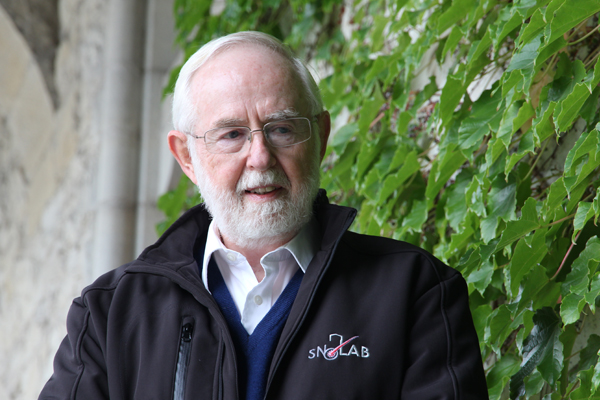Welcome to the Academy
May 3, 2016
Share
Queen’s University Professor Emeritus Art McDonald’s research on neutrino oscillations has garnered widespread acclaim from the scientific community. His work has earned him, amongst other honours, the Killam Prize in the Natural Sciences, the 2015 Nobel Prize in Physics and an appointment as a Companion of the Order of Canada. Included in that group is his recent election to the US National Academy of Science (NAS).

“It is a great honor to be elected as a foreign associate of the National Academy of Sciences of the United States,” Dr. McDonald says. “With my graduate work at Caltech, a professorship at Princeton and extensive collaboration with US scientists throughout my research career, particularly in the SNO experiment, this honor is very significant to me. I have really valued my connections to the United States scientific community.”
Dr. McDonald is joined by 20 fellow researchers from 14 countries who were named Foreign Associates of the Academy. Their election to the academy comes in recognition of their distinguished and continuing achievements in original research. Of the 465 foreign associates in the Academy, Dr. McDonald is one of only 18 Canadians. Foreign associates are nonvoting members of the Academy, with citizenship outside the United States.
“Dr. McDonald is one of the most distinguished Canadian physicists of his generation,” says Dr. Steven Liss, Vice-Principal (Research). “Election to the National Academy of Science is a tremendous international honour and a testament to his leadership, and to the fundamental importance and impact of his ground-breaking research on neutrinos.”
Dr. McDonald’s research, conducted at the Sudbury Neutrino Observatory, determined neutrinos are capable of changing their type – indicating that they have mass. He remains involved in research at SNOLAB, including the DEAP experiment, which has developed one of the most sensitive experiments ever with the goal of direct detection of dark matter. Dr. McDonald is also a collaborator on the SNO+ experiment which will look for a rare radioactivity called neutrinoless double beta decay to provide further information on the basic properties of neutrinos.
The Academy boasts a total number of 2,291 active members.Established under a congressional charter signed by President Abraham Lincoln in 1863, the National Academy of Science recognizes achievement in science and provides science, technology, and health policy advice to the US federal government and other organizations.
To learn more about the US National Academy of Science visit the website.